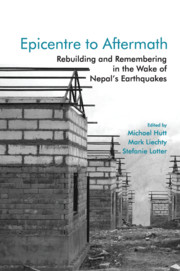8 - The Politics of Participatory Disaster Governance in Nepal's Post-Earthquake Reconstruction
Published online by Cambridge University Press: 08 July 2021
Summary
Introduction
The 2015 Nepal earthquakes were not only an epicentre of human suffering, they also invigorated various forms of citizen- and civil-society-driven initiatives that brought both the Government of Nepal and the humanitarian community under close public scrutiny and criticism (Dhungana 2019). Amid these criticisms, the government adopted the globally circulated vision to ‘build back better’ Nepal, with a focus on the ‘owner-led reconstruction’ of damaged houses that also pledged a participatory and accountable governance of reconstruction. The ‘Nepal Earthquake 2015: Post-disaster Needs Assessment’ (PDNA) report, a major policy document published in June 2015, less than two months after the first earthquake, articulated the government's commitment to the participatory governance of reconstruction as follows:
The GoN [Government of Nepal] will work to strengthen governance systems more broadly in line with the Good Governance Act of 2006 [sic]. This will include strengthening accountability processes, working collaboratively with civil society, strengthening citizen service centres and rule of law processes, and ensuring the participation of the most vulnerable, affected populations in decision-making processes. (NPC 2015b: 255)
The National Reconstruction Act, promulgated in December 2015, reiterated the government's vision of ‘prompt completion of the reconstruction works’, coupled with a sustainable, resilient, and social-justice-based approach to longer term reconstruction (Government of Nepal, Ministry of Law, Justice and Parliamentary Affairs 2015). The Act also laid the foundation for a central body, the National Reconstruction Authority (NRA), which would be responsible for overseeing and coordinating post-disaster reconstruction.
Using Nepal's post-earthquake environment as an empirical context, this chapter engages with the hitherto little understood topic of the politics of participatory disaster governance within post-disaster reconstruction efforts. Drawing on the concept of spaces of participation (Gaventa 2006), and using an ethnographic mode of inquiry, the chapter critically investigates the interface between the policy and practice of participatory governance in Nepal's post-earthquake housing reconstruction. Specifically, it aims to locate the politics of participatory governance of disasters within state–society relations and explores the potential and limitations of such politics in enabling disaster-affected citizens to influence the policy and practice of housing reconstruction.
- Type
- Chapter
- Information
- Epicentre to AftermathRebuilding and Remembering in the Wake of Nepal's Earthquakes, pp. 179 - 202Publisher: Cambridge University PressPrint publication year: 2021
- 1
- Cited by



